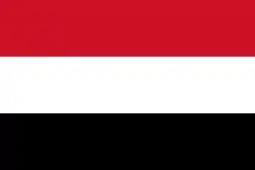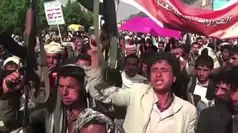Slogan of the Houthi movement
The slogan of the Houthi movement (officially called Ansar Allah), a political and religious movement and rebel group in Yemen, reads "Allah is Greater, Death to America, Death to Israel, Curse on the Jews, Victory to Islam" in Arabic text. It is often portrayed on a white flag, with the written text in red and green.
 | |
| Use | Slogan, rallying symbol |
|---|---|
| Proportion | 75:53 (1.414) (varies by size) |
| Design | A white flag with the Houthis slogan in red and green with the green border |
Background


Inspired by the motto of revolutionary Iran,[1] the slogan "Allah is the Greatest, Death to America, Death to Israel, Curse on the Jews, Victory to Islam" was originally not tied to the Houthi movement. Its exact origin is disputed. Some sources state that it was first chanted at the Imam al-Hadi school in Marran in January 2002, while others claim that Hussein Badreddin al-Houthi used it after seeing footage of a young Palestinian dying in his father's arms during the Second Intifada in 2000. The slogan eventually became a sign of public protest against the dictatorship of Yemeni President Ali Abdullah Saleh. It was first widely used during a visit of Sa'dah by Saleh in January 2003. At the time, the President intended to make a speech during the Friday prayers, but was drowned out by locals who chanted the slogan to protest against his policies. The Yemeni government responded with a crackdown, and 600 people were arrested for having used the slogan. This only worsened the situation, however, and the slogan spread in northern Yemen.[2]
The Houthi movement officially adopted the slogan in the wake of the 2003 invasion of Iraq which was widely condemned in the Arab world.[3] This brought the movement on full collision course with the government, as the latter maintained its official pro-American politics despite public opposition. The slogan was outlawed, but the Houthis refused to discard it, arguing that the constitution of Yemen protected free speech. By 2004, crackdowns against both the slogan as well as the Houthi movement intensified. Many Houthis were imprisoned and even tortured for having used it. The conflict between the Houthis and the government eventually resulted in the outbreak of a violent insurgency in the northern country.[2]

Despite the religious overtones of their slogan, the Houthis self-identify as Yemeni nationalist group opposed to the oppression of all Yemenis, including Sunni Muslims, by foreigners.[4][5][6] Though the slogan is the most prominent symbol of the Houthi movement, often displayed on placards and flags, the Houthis also display the regular flag of Yemen as a rallying symbol.[7] The Palestinian flag is used, as well, by the Houthi supporters in support of the Palestinian cause.[8]
Some Houthi supporters state that their ire for the U.S. and Israel is directed toward the governments of America and Israel. Ali al-Bukhayti, the spokesperson and official media face of the Houthis, rejected the literal interpretation of the slogan by stating in one of his interview that "We do not really want death to anyone. The slogan is simply against the interference of those governments [i. e., U.S. and Israel]".[9] In the Arabic Houthi-affiliated TV and radio stations they use religious connotations associated with jihad against Israel and the US.[10] The movement also called Saudi Arabia "a U.S. puppet state".[11]
Motto
| Arabic | Transliteration | English |
|---|---|---|
ٱللَّٰهُ أَكْبَرُ | Allāhu ʾakbar | God is greater [than everything] |
ٱلْمَوْتُ لِأَمْرِيكَا | al-mawt li-ʾAmrīkā | Death to America |
ٱلْمَوْتُ لِإِسْرَائِيلِ | al-mawt li-ʾIsrāʾīl | Death to Israel |
ٱللَّعْنَةُ عَلَیٰ ٱلْيَهُودِ | al-laʿnah ʿalā 'l-Yahūd | Curse upon the Jews |
ٱلنَّصْرُ لِلْإِسْلَامِ | an-naṣr lil-ʾIslām | Victory to Islam |
Gallery
 A building in Yemen bearing the slogan
A building in Yemen bearing the slogan Protesters with slogan placards
Protesters with slogan placards
See also
- Flag of Yemen
- Coat of arms of Yemen
References
- ShahidSaless, Shahir (30 March 2015). "Does Iran really control Yemen". Al Monitor. Archived from the original on 13 February 2015.
- Lucas Winter. "Conflict in Yemen: Simple People, Complicated Circumstances". Middle East Policy Council. Retrieved 20 April 2019.
- Bruce Riedel (18 December 2017). "Who are the Houthis, and why are we at war with them?". Brookings. Retrieved 20 April 2019.
- Asher Orkaby (25 March 2015). "Houthi Who? A History of Unlikely Alliances in an Uncertain Yemen". Foreign Affairs. Retrieved 20 April 2019.
- Cameron Glenn (29 May 2018). "Who are Yemen's Houthis?". Wilson Center. Retrieved 20 April 2019.
- Manish Rai (13 April 2018). "Iran Developing Houthis as its Long-Term Asset". International Policy Digest. Retrieved 20 April 2019.
- Henry Ridgwell (4 September 2015). "Yemen Fighting Intensifies as Fears Grow of Sectarian Conflict". VOA. Retrieved 20 April 2019.
- https://yemen-rw.org/in-pictures-tens-of-thousands-of-yemenis-rally-in-support-of-palestine/
- "Photo Essay: Rise of the Houthis". Newsweek. 9 February 2015. Retrieved 27 March 2015.
- "Houthi propaganda: following in Hizbullah's footsteps". alaraby. Retrieved 15 October 2016.
- "PressTV-'Saudi Arabia puppet of US, Israel'". Retrieved 2018-03-02.